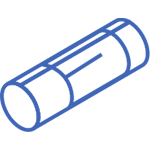

Siemens 3SB29014RF
Manufacturer No:
3SB29014RF
Tiny WHSLManufacturer:
Utmel No:
2239-3SB29014RF
Package:
-
Description:
INSC LABEL F. 3SB2 FLAT/ILL. PB5
Quantity:
Unit Price: $2.746205
Ext Price: $2.75
Delivery:





Payment:











In Stock : 10
Minimum: 1 Multiples: 1
Qty
Unit Price
Ext Price
1
$2.746205
$2.75
10
$2.590759
$25.91
100
$2.444112
$244.41
500
$2.305766
$1,152.88
1000
$2.175251
$2,175.25
Want a lower wholesale price? Please send RFQ, we will respond immediately.
RFQ Now
Add to RFQ list
You may place an order without registering to Utmel.
We strongly suggest you sign in before purchasing as you can track your order in real time.
For your convenience, we accept multiple payment methods in USD, including PayPal, Credit Card, and wire transfer.
RFQ (Request for Quotations)It is recommended to request for quotations to get the latest prices and inventories about the part.
Our sales will reply to your request by email within 24 hours.
1. You'll receive an order information email in your inbox. (Please remember to check the spam folder if you didn't hear from us).
2. Since inventories and prices may fluctuate to some extent, the sales manager is going to reconfirm the order and let you know if there are any updates.
- TypeParameter
- Mounting Type
The "Mounting Type" in electronic components refers to the method used to attach or connect a component to a circuit board or other substrate, such as through-hole, surface-mount, or panel mount.
Footed - Shape
In electronic components, the parameter "Shape" refers to the physical form or outline of the component. It describes the external appearance of the component, including its dimensions, size, and overall structure. The shape of an electronic component can vary widely depending on its function and design requirements. Common shapes include rectangular, cylindrical, square, and circular, among others. The shape of a component is an important consideration in the design and layout of electronic circuits, as it can impact factors such as space utilization, heat dissipation, and ease of assembly.
Round - EnclosureTotally Enclosed Fan Cooled
- Manufacturer Part Number1504SDSA41A-PR
- ManufacturerToshiba
- RoHSNo
- PackageBox
- Base Product Number
"Base Product Number" (BPN) refers to the fundamental identifier assigned to a component by the manufacturer. This number is used to identify a specific product family or series of components that share common features, characteristics, or functionality. The BPN is usually part of a larger part number or order code that includes additional information, such as variations in packaging, tolerance, voltage ratings, and other specifications.
3SB2901 - MfrSiemens
- Product StatusActive
- For Use With/Related ProductsPushbutton Switches
- Imprint ISO symbolsOther
- ImprintWithout imprint
- Series
In electronic components, the "Series" refers to a group of products that share similar characteristics, designs, or functionalities, often produced by the same manufacturer. These components within a series typically have common specifications but may vary in terms of voltage, power, or packaging to meet different application needs. The series name helps identify and differentiate between various product lines within a manufacturer's catalog.
- - TypeGeneral Purpose
- Composition
Parameter "Composition" in electronic components refers to the specific materials and substances used in the construction of the component. It encompasses the chemical and physical elements that make up the component, influencing its electrical, thermal, and mechanical properties. The composition can affect the performance, reliability, and durability of the component in various applications. Understanding the composition is essential for optimizing the design and functionality of electronic devices.
Cast Iron - Frequency
In electronic components, the parameter "Frequency" refers to the rate at which a signal oscillates or cycles within a given period of time. It is typically measured in Hertz (Hz) and represents how many times a signal completes a full cycle in one second. Frequency is a crucial aspect in electronic components as it determines the behavior and performance of various devices such as oscillators, filters, and communication systems. Understanding the frequency characteristics of components is essential for designing and analyzing electronic circuits to ensure proper functionality and compatibility with other components in a system.
60 Hz - Accessory Type
Accessory Type in electronic components refers to additional items or attachments that enhance the functionality or usability of primary components. These can include connectors, adapters, mounting hardware, and protective casings. Accessory Types are essential for ensuring compatibility and achieving optimal performance in electronic systems.
Marking - Label, Strips, Tags - RPM
RPM stands for Revolutions Per Minute, and it is a measurement of the rotational speed of a component, such as a motor or a fan. In electronic components, RPM is commonly used to specify the speed at which a component operates. For example, a computer fan may have a maximum RPM rating to indicate how fast it can spin to provide adequate cooling. RPM is an important parameter to consider when selecting components for a system, as it can impact performance, efficiency, and noise levels. Monitoring and controlling RPM can also be crucial for maintaining the proper functioning and longevity of electronic components.
1,800 RPM - Bearing Type
there are several different types of bearings, including ball and roller bearings, linear bearings, as well as mounted versions that may use either rolling element bearings or plain bearings.
Ball - Overload Protection
Overload protection is a protection against a running overcurrent that would cause overheating of the protected equipment. Hence, an overload is also type of overcurrent. Overload protection typically operates on an inverse time curve where the tripping time becomes less as the current increases.
None - Phase
Phase in electronic components refers to the position of a waveform relative to a reference point in time, often measured in degrees. It indicates the timing relationship between two or more signals, such as voltage and current in an AC circuit. Phase differences can impact the behavior of circuits, affecting power transfer and resonance in reactive components. Understanding phase is essential for designing and analyzing circuits, especially in communications, signal processing, and power electronics.
3 - Width0
- Height0



















